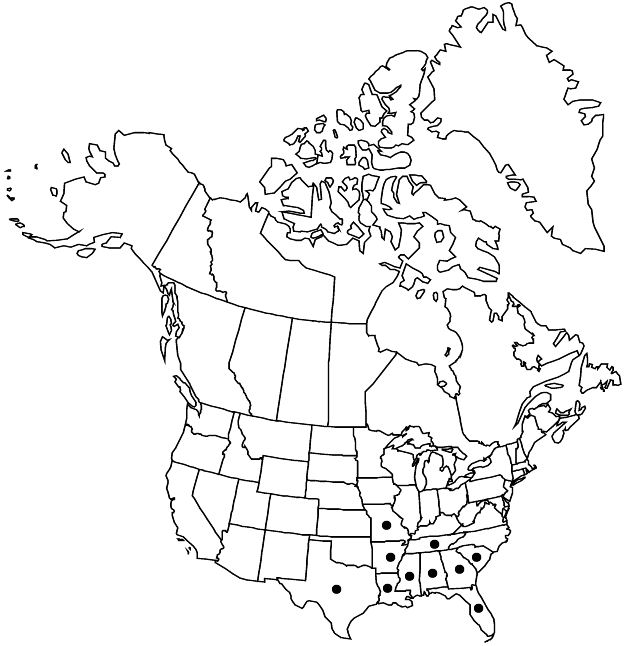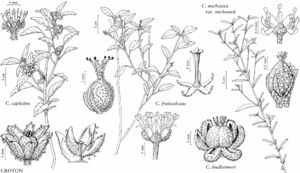Croton lindheimeri
Class-book Bot. ed. s.n.(b), 631. 1861.
Herbs, annual, 5–20 dm, monoecious, stems, leaves, and buds with yellow-brown (ochraceous) pubescence when young, becoming glabrate. Stems branching distally, stellate-hairy. Leaves not clustered; stipules linear, 0–5 mm; petiole 1.5–7 cm, glands absent at apex; blade ovate-lanceolate, 3–7 × 1–3 cm, base cordate to rounded or subcordate, margins entire, apex acute, abaxial surface pale green, not appearing brown-dotted, no stellate hairs with brown centers, densely stellate-hairy, adaxial surface greener, more sparsely hairy. Inflorescences bisexual, racemes, 1.5–3 cm, staminate flowers 8–15, pistillate flowers 2–7. Pedicels: staminate 0.5–3 mm, pistillate 0–1 mm. Staminate flowers: sepals (4–)5, 1.5–2 mm, abaxial surface stellate-hairy; petals 5, linear-oblong, 1–1.5 mm, abaxial surface stellate-hairy; stamens 9–13. Pistillate flowers: sepals 7–8, equal, 5–7 mm, margins entire, apex straight to slightly incurved, abaxial surface yellowish woolly-tomentose; petals 0; ovary 3-locular; styles 3, 3–4 mm, 2 times 2-fid, terminal segments 12. Capsules 6–8 × 8–9 mm, smooth; columella tipped with 3-pronged grappling hooklike appendage. Seeds 4–5 × 4–4.5 mm, shiny. 2n = 20.
Phenology: Flowering May–Dec.
Habitat: Old pastures, forest openings, bottomlands, fence rows, disturbed areas.
Elevation: 0–300 m.
Distribution

Ala., Ark., Fla., Ga., La., Miss., Mo., S.C., Tenn., Tex.
Discussion
Croton lindheimeri is very similar to C. capitatus, and the two can sometimes be found growing together in northeastern Texas. Croton lindheimeri can be distinguished by its more ochraceous pubescence on young growth, consistently acute leaf tips, somewhat more elongated pistillate part of the raceme, and pistillate sepal tips that do not recurve after anthesis. Croton lindheimeri was reported from Indiana, adventive on ballast in 1898, and from Kansas based on a single 1883 collection from Miami County, but apparently did not become established in either state.
Selected References
None.
